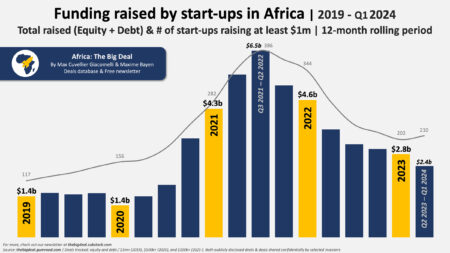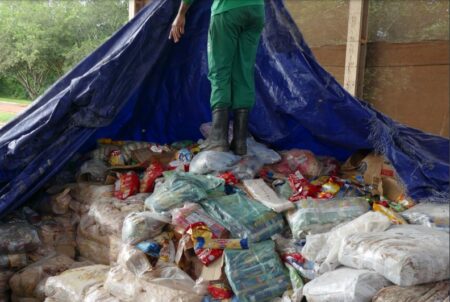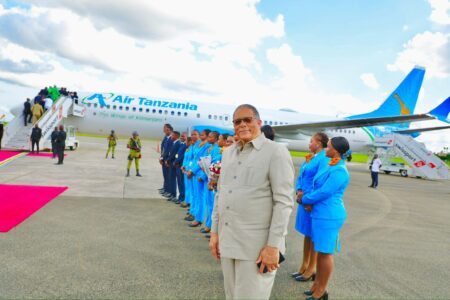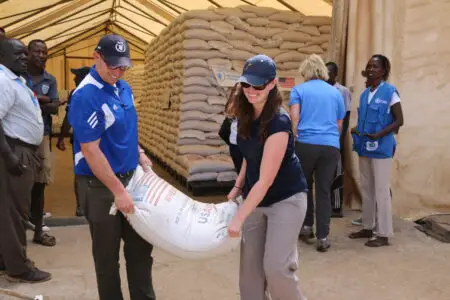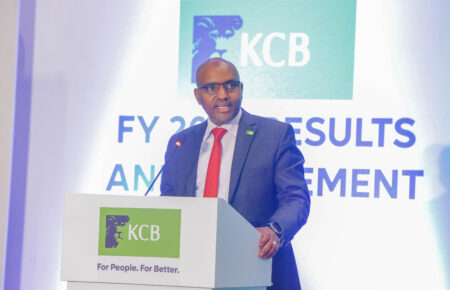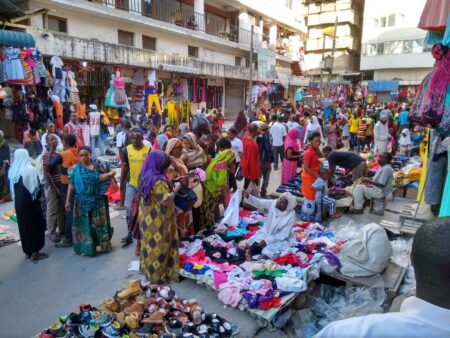- Africa’s new dawn: the rising role of digital and AI in agriculture
- Can Dangote Refinery Transform Africa Energy Ambition
- Gallup Survey: 80 per cent of Kenyan Workers Are Disengaged and Seek New Opportunities
- Madagascar Man Freed from 5KG Tumor After 15-Year Struggle
- How women in Africa are perceived and treated
- Sugar consumption in Kenya to Increase to 1.23 Million Tonnes
- Can Somalia and Turkey Oil deal Bring Change in Somaliland
- Remittances to Kenya dropped to $371.6 million in June, marking a six month low
Browsing: Tanzania
- Ventures interested in applying for the Investment Showcase can submit applications here by 2nd May.
- To qualify, the ventures must be African, have at least one African co-founder or be headquartered in Africa.
- They must also offer a product or service designed for scalability, and be able to present in person at the Africa Tech Summit (ATS) London.
On June 7th, 2024, the Africa Tech Summit (ATS) London will convene at the London Stock Exchange for its eighth edition, continuing its tradition of fostering business and investment opportunities in Africa and around the world.
This tech conference, known for its dynamic engagement and insight into the African continent’s tech industry, is poised to attract over 300 African and international tech leaders, policymakers, investors, entrepreneurs, and corporates.
The summit’s key event, the Investments Showcase, is inviting African tech ventures to present their business models to a curated audience of potential investors …
- 121 African startups secured $466M, marking a 27 per cent drop from the previous quarter; women-led startups got 6.5 per cent of the capital.
- About 87 per cent of startup funding in the three months to March went to entities in Nigeria, Kenya, Egypt, and South Africa.
- Gender imbalance persists as only 6.5 per cent of the financing went to female-led startups in Africa.
The big four economies of Nigeria, South Africa, Kenya, and Egypt continue to attract the highest share of funding going to startups in Africa, even as the ecosystem suffered a 27 per cent drop in financing to $466 million in the three months to March 2024.
The latest analysis from Africa: The Big Deal shows that 87 per cent of startup funding in the three months to March went to upcoming entities in Nigeria, Kenya, Egypt and South Africa.
Attracting $160 million, Nigeria’s economy accounted for …
- As millions of people in Africa go to bed hungry today, tonnes of food will end up in landfills, too.
- A UN report identifies gaps in Africa’s retail and food service sectors, presenting a significant hurdle in fully understanding the scope of food wastage.
- The UNEP Food Waste Index Report 2024 identifies critical areas where action is needed to address the challenge in Africa.
An estimated one billion meals go to waste every day in Africa and across the world, the UNEP Food Waste Index Report 2024 reveals. The report, which shows food waste continues to hurt the global economy, adds that 783 million people were affected by hunger. In contrast, a third of the worldwide population suffered food insecurity in 2022.
…Ohio State Team Jersey
custom made football jerseys
detroit lions jersey
johnny manziel jersey
College Football Jerseys
custom football jerseys
custom made football jerseys
custom made football jerseys
micah parsons jersey
detroit lions jersey
micah parsons jersey
custom made football jerseys
florida state football jersey
OSU Jerseys
- In 2022, investments in Tanzania rose by $3.16 billion between July and November.
- Currently, Tanzania has stable economic diplomatic relations with global economic giants, China and US.
- Tanzania’s economy is expected to expand by 5.5 percent in 2024.
“Kazi Iendelee” Swahili term for “Let’s Proceed with Work” has become a national rallying call for progress in Tanzania under President Samia Suluhu Hassan, who is popularly referred by Mama Samia – a Swahili term of endearment and respect.
Even from foreign capitals, President Samia’s work is catching the eye of fellow leaders. When US Vice President Kamala Harris came visiting, she …
Ohio State Team Jersey
Ohio State Team Jersey
Iowa State Football Uniforms
ohio state jersey
Ohio State Team Jersey
custom made football jerseys
custom made football jerseys
asu football jersey
detroit lions jersey
Ohio State Team Jersey
Florida state seminars jerseys
Iowa State Football Uniforms
49ers jersey
Iowa State Football Uniforms
- Air Tanzania has received Boeing 737-9 Max, its second aircraft from the US carrier manufacturer.
- A second Boeing 737-9 Max symbolizes Tanzania’s steady journey in enhancing its budding aviation sector.
- With the new aircraft, Air Tanzania now shifts focus to strategic expansion, operational efficiency, and overcoming challenges such as a biting shortage of pilots.
Air Tanzania Company Limited is on an aggressive expansion drive as it welcomes Boeing 737-9 Max, its second aircraft from the US carrier manufacturer. A second Boeing 737-9 Max symbolizes Tanzania’s steady journey in enhancing its aviation sector but also sets the …
- Tanzania and Rwanda are warming up to set up second official border post.
- Currently, Rwanda is the third largest user of Dar es Salaam port.
- More than 80% of Rwanda’s cargo goes through the port of Dar es Salaam.
The push to foster EAC integration appears to be moving in a positive direction with Tanzania and Rwanda taking steps to enhance one of East Africa Community (EAC) pivotal goal, regional trade.
A top Tanzanian envoy has announced plans to open a new border post with Rwanda, as part of ongoing measures between the two countries to scale up the movement of labour, goods and services providers.
Tanzania’s Minister of Foreign Affairs and East African Cooperation, January Makamba, made the announcement at the end of his four-day state visit to Rwanda.
The Minister revealed that the proposed border crossing will be set up in Tanzania’s Kyerwa district in Kagera Region and …
- Questions are lingering about US food aid to Tanzania that targets schools, with critics terming it unnecessary.
- US food aid to Tanzania has been ongoing for the past decade.
- Tanzania now wants the US to buy the food from Tanzanian farmers and fortify it in public.
An ongoing program of US food aid to Tanzania has come under sharp scrutiny after the public in East Africa’s second largest economy took to social media condemning the support from the American people.
At the moment, X (formally Twitter) is awash with Tanzanians and its thousands of nationals in the diaspora questioning the safety of US food aid which authorities in the country received recently.
Raising more questions was the fact that the food aid was not distributed to the general public but to hundreds of schools.
In its defense, the Tanzania Bureau of Standards (TBS) has issued a public statement saying the …
- East Africa’s banking giant KCB Group reports heightened operational expenses, which surged to $627 million in 2023, up from $447.9 million in 2022.
- The costs are associated with the consolidation of its subsidiary in the Democratic Republic of Congo, Trust Merchant Bank (TMB),
- Additional expenditures were related to a voluntary retirement scheme as well as litigation fees.
KCB Group, one of East Africa’s banking giants, has reported a net profit decline to $282 million for the year ending December 2023, from $307 million in 2022.
The bank has attributed this decline to increased operational costs and higher provisions for bad loans as primary reasons for the downturn in profitability.
In a period marked by economic challenges and strategic expansions, KCB Group faced heightened operational expenses, which surged to $627 million in 2023, up from $447.9 million in 2022.
DRC-based Trust Merchant Bank consolidation costs
This increase was largely due to …
- Tanzania is reviewing key business development laws to boost investments.
- One of the laws under review is the Companies Act and the Business Names (Registration) Act.
- Amended laws are set to create a more conducive investment environment.
The Tanzania business environment is expected to improve to a great deal thanks to ongoing efforts to amend non-conducive business laws.
It is expected that the business law amendment will serve to help the country attract investors by improving its business environment, the government has announced.
The government of Tanzania has made public its intention to review key laws in the country, including the Companies Act and the Business Names (Registration) Act, with a view to align the regulations with current global trends and market needs.
To this end, the government of Tanzania is now collecting stakeholders’ opinions ahead of the proposed law amendments.
While the two laws are often confused and intertwined, …
- Tanzania’s population is expected to reach 140 million people by 2050.
- The World Bank estimates that Tanzania’s population will double every 23 years.
- Tanzania set to become one of Africa’s and the world’s most populated countries.
Tanzania’s population is expected to reach 140 million people by 2050 given the current high fertility rate of 3.0 per cent. At this rate, the World Bank estimates that Tanzania’s population will double every 23 years henceforth.
In its latest Tanzania Economic Update that was launched in the country’s port city of Dar es Salaam this March, the World Bank says when it comes to population control, the East African country is facing a delicate balance act.
On the one hand, Tanzania has managed to lower its mortality rates and raise its life expectancy but as a result, it is now facing the effects of high birth rates and, they are not all good.…






